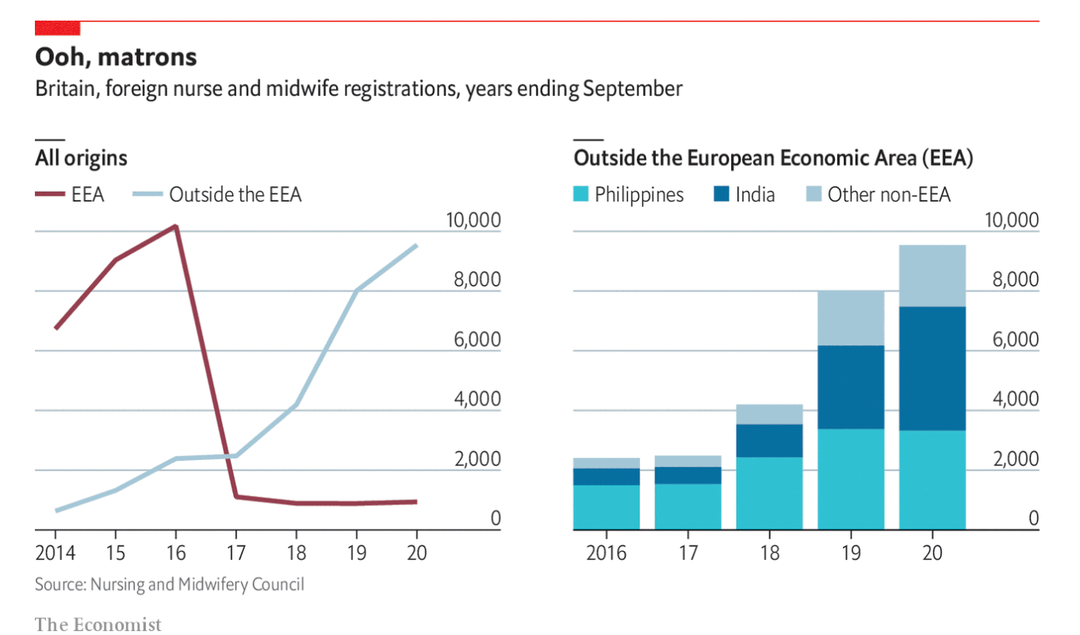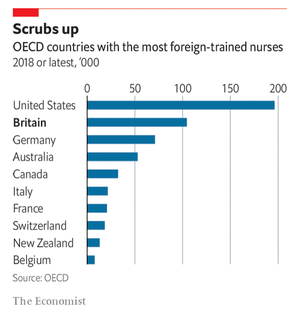
Dec. 14, 2020
WHEN THE World Health Organisation (WHO) declared 2020 the “Year of the Nurse and Midwife” last year, to coincide with the 200th anniversary of Florence Nightingale’s birth, few could have imagined that health-care workers would have such a turbulent time.

iStock-167590316.jpg
They have accounted for around 10% of covid-19 cases, according to the International Council of Nurses, a federation of national nursing associations. The disease has killed at least 1,500 nurses. But, as well as highlighting their bravery and skill, the pandemic has exacerbated a problem with nurses: there aren’t enough of them. England’s National Health Service, for example, went into the pandemic with 40,000 nursing vacancies, a shortfall that is expected to reach 100,000 in a decade according to the Health Foundation, a think-tank. The WHO reckons that 6m extra nurses are needed globally.

To plug the gaps, Britain, like many rich countries, depends on migration. Foreign-trained nurses account for 15% of all of Britain’s nurses—over 100,000 of them, making Britain the largest destination country after America. But this workforce, once largely recruited from the European Union, is changing as employers turn to Asia (see charts). Last year fewer than 1,000 European nurses registered to work in Britain, compared with 9,389 four years earlier. The number of registrants from outside of Europe, meanwhile, rose from 2,135 to 12,033 over the same period. Two factors have caused this shift: Brexit, which has slowed the arrival of European nurses to a trickle and prompted 5,000 to leave, and the loosening of immigration rules for nurses from outside the EU.

Britain’s reliance on foreign nurses raises questions about its effect on poorer countries. The Philippines and India, the world’s biggest exporters of nurses, and the origin of most of Britain’s new foreign nurses, paint a complicated picture. Britain’s government has a list of developing countries from which it does not recruit health workers, to prevent a brain-drain. The Philippines and India are on this list, but Britain has agreed on exceptions with their respective governments. Both countries are known for their private nursing schools which train aspiring migrants who are eager to go abroad. “Recruiting there is not regarded as unethical,” says James Buchan of the Health Foundation. “There is an expectation that these nurses, mainly paying for their training, will move abroad.” Indeed, many Filipinos and Indians rely on money that family members working abroad send home: remittances amounted to 9% of the Philippines’ GDP last year.
But India and the Philippines face shortages, too, although both countries train more nurses than they need. In Britain there are more than eight nurses per 1,000 people, compared with less than five in the Philippines and two in India. The WHO reckons the Philippines will face a shortfall of almost 250,000 nurses by 2030. Nurses in these countries often face widespread unemployment, low wages and poor career opportunities, which encourages graduates to move abroad.
International recruitment will continue as long as the world needs nurses, but filling vacancies will be difficult unless pay and working conditions improve, especially in poorer countries, according to the WHO. In July a report by Britain’s Royal College of Nursing found that 36% of its members were thinking about leaving the profession, an increase of 9% from 2019. After the threat of covid-19 has faded, rich and poor countries alike will be left wondering if they have enough nurses to weather another pandemic.


